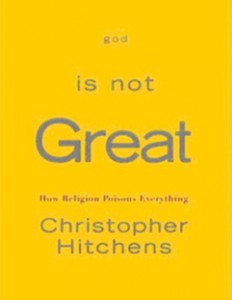God Is Not Great: How Religion Poisons Everything

Its ability to withstand an assault by Christopher Hitchens is one testament to the hardiness of religious faith. (I wouldn’t want him mad at me.) A famously adept debater, armed with wit and erudition, Hitchens can be persuasive even when he’s wrong. Not that many humanists are likely to find much wrong in his indictment of religion, although some may harbor more sympathetic views of it than he. But a lesser intellect could effectively condemn religion to the satisfaction of nontheists. The question is, will many theists be swayed by Hitchens’ critique, or is he simply preaching to the unconverted?
Considering my own agnosticism, I’m not in a position to judge, but I’m willing to guess that the best response for which Hitchens can hope from sophisticated, open-minded believers is, “Yes, but . . . .” (I’m not terribly interested in the reaction of unsophisticated, close-minded religionists, and neither, I suspect, is he.)
“Yes, but religion is more than the sum of its biases, neuroses, and abuses” (which Hitchens so effectively skewers), I imagine some believers will say. It’s difficult for rational theists to deny the historic role of religious belief in promoting or sustaining violence, authoritarianism, and implacable biases, among other evils. Rational theists (those who are capable of distinguishing between matters of faith and reason) acknowledge religion’s excesses but are apt to blame them on false beliefs rather than on religious belief itself and the religious impulse. Describe 9/11 as a faith-based attack, and believers are likely to counter that it was based on a false faith.
This assertion that some religions are false and others are actually or potentially true enables theists to rationalize the idiocies and horrors of belief. Their distinctions between true and false faiths resolve the dissonance that’s apparent in findings like this: 80 percent of people surveyed by The Pew Research Center in 2002 characterized the influence of religion in the world as a good thing–even though 65 percent also concurred that “religion plays a significant role in most wars and conflicts in the world.” Nontheists dismiss all religions as false or potentially false, which is why they’re often more reliable guardians of religious liberty: if you regard all religions with equal skepticism, you’re less likely to discriminate among them.
Hitchens is most equitable in his disdain, indicting both Eastern and Western religions, and even believers who bridle at his tone might appreciate the time he has taken to study their texts and the history of their sects. Then again, they might wish he had left them alone. His faithless, cold-eyed analysis finds few if any sins of which religion isn’t guilty.
“Violent, irrational, intolerant, allied to racism and tribalism and bigotry, invested in ignorance and hostile to free inquiry, contemptuous of women and coercive toward children,” religions are also nihilistic, Hitchens adds, characterizing apocalyptic thinking as their “constant trope.” The religious impulse facilitates totalitarianism, he observes (in response to claims that Stalinism and other totalitarian regimes prove the moral bankruptcy of atheism). Religion is even bad for our health, he adds, citing religious opposition to condoms and vaccines. Of course, it’s also easy to find examples of religious authorities embracing medical advances. The preeminent eighteenth-century American theologian Jonathan Edwards was an early proponent of the smallpox vaccine and arranged to have himself and his family inoculated. He died from the vaccine, science proving worse for his health than religion. “An anomaly,” I suspect Hitchens would respond. His point is that medicine, like other scientific endeavors, is anathema because it threatens religion’s primacy.
He seems both resigned, however angrily, to religion’s hold on people and puzzled by its continued dominance. Belief in gods reflects fear of death and wishful thinking about immortality, Hitchens recognizes; still he marvels that religions compete so effectively with science.
- Religion comes from the period of human prehistory where nobody . . . had the smallest idea what was going on. It comes from the bawling and fearful infancy of our species, and is a babyish attempt to meet our inescapable demands for knowledge (as well as for comfort, reassurance, and other infantile needs).
Religious belief is now “optional,” Hitchens stresses, as “Many religions now come before us with ingratiating smirks and outspread hands, like an unctuous merchant in a bazaar.” Still religions lose more market share to each other than to science. Some religions fare better than others, but faith seems to have little to fear from reason.
Depending on your point of view this is either a disaster for the human race, the only hope for our salvation, or a simple fact of life, with consequences uncertain. Does religious belief do us any good? For every act of cruelty associated with religion, believers will point to acts of compassion–for which Hitchens credits humanism, not religion. I’m not sure what he means by humanism; I credit–and blame–human nature. The suggestion that humanism (or any nontheistic belief system) is responsible for all the good that men and women do, while religion, poisoning everything, is responsible for evil seems a bit unfair. But it complements the tendency of believers to credit “true” religion for virtue, while blaming false religions, or no religion, for vice.
Religion dooms us, in Hitchens’ view. God Is Not Great is his call to action–a call to rationalists to stop tolerating religious belief and start defeating it. With more defiance than hope, he calls for a new Enlightenment. Faith may usher in another dark age instead, but no one should be surprised that Christopher Hitchens won’t go into it quietly.
Copyright©Wendy Kaminer 2007. Wendy Kaminer is a lawyer and writer; her books include Sleeping With Extra-Terrestrials: The Rise of Irrationalism and Perils of Piety.
